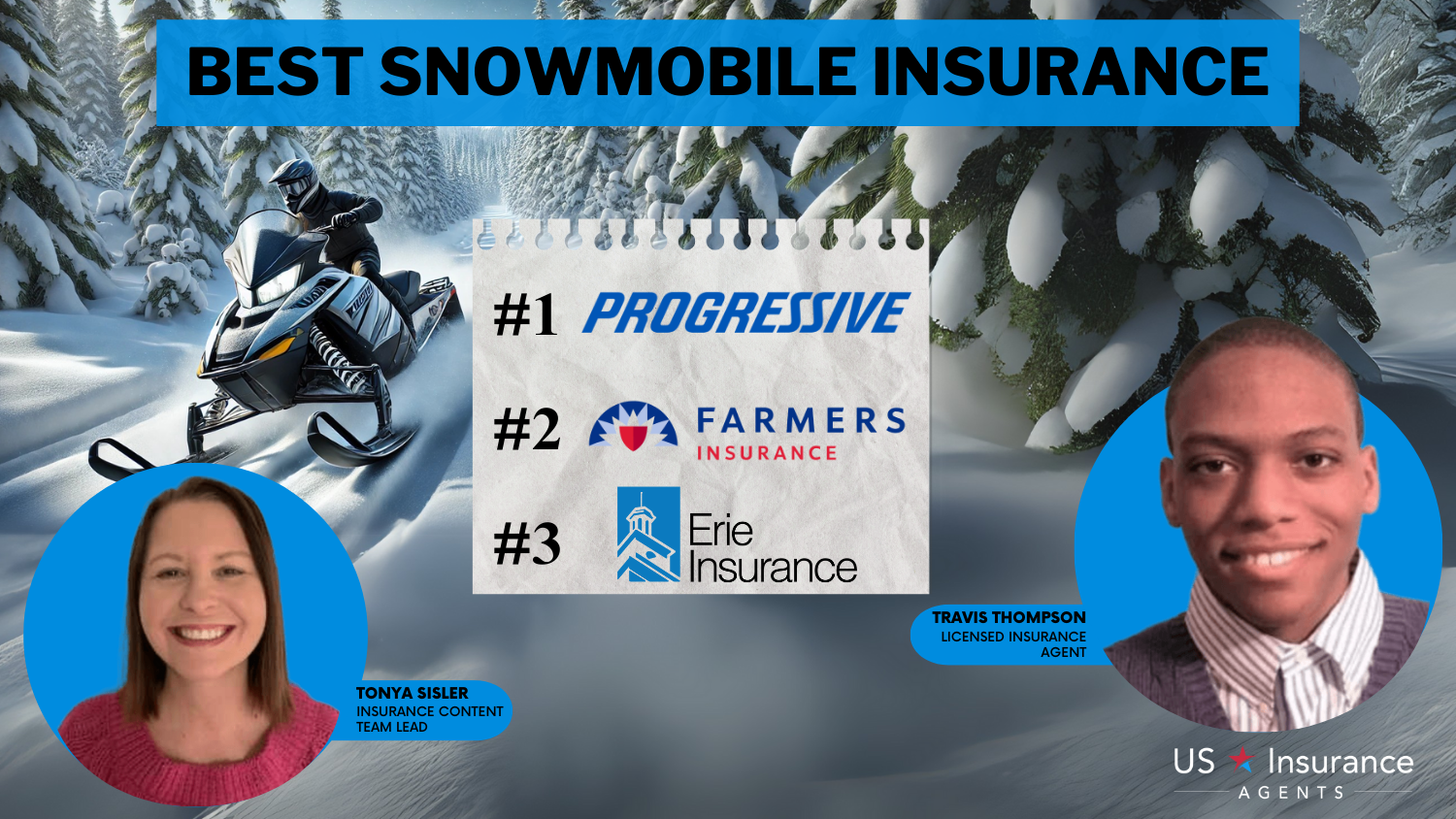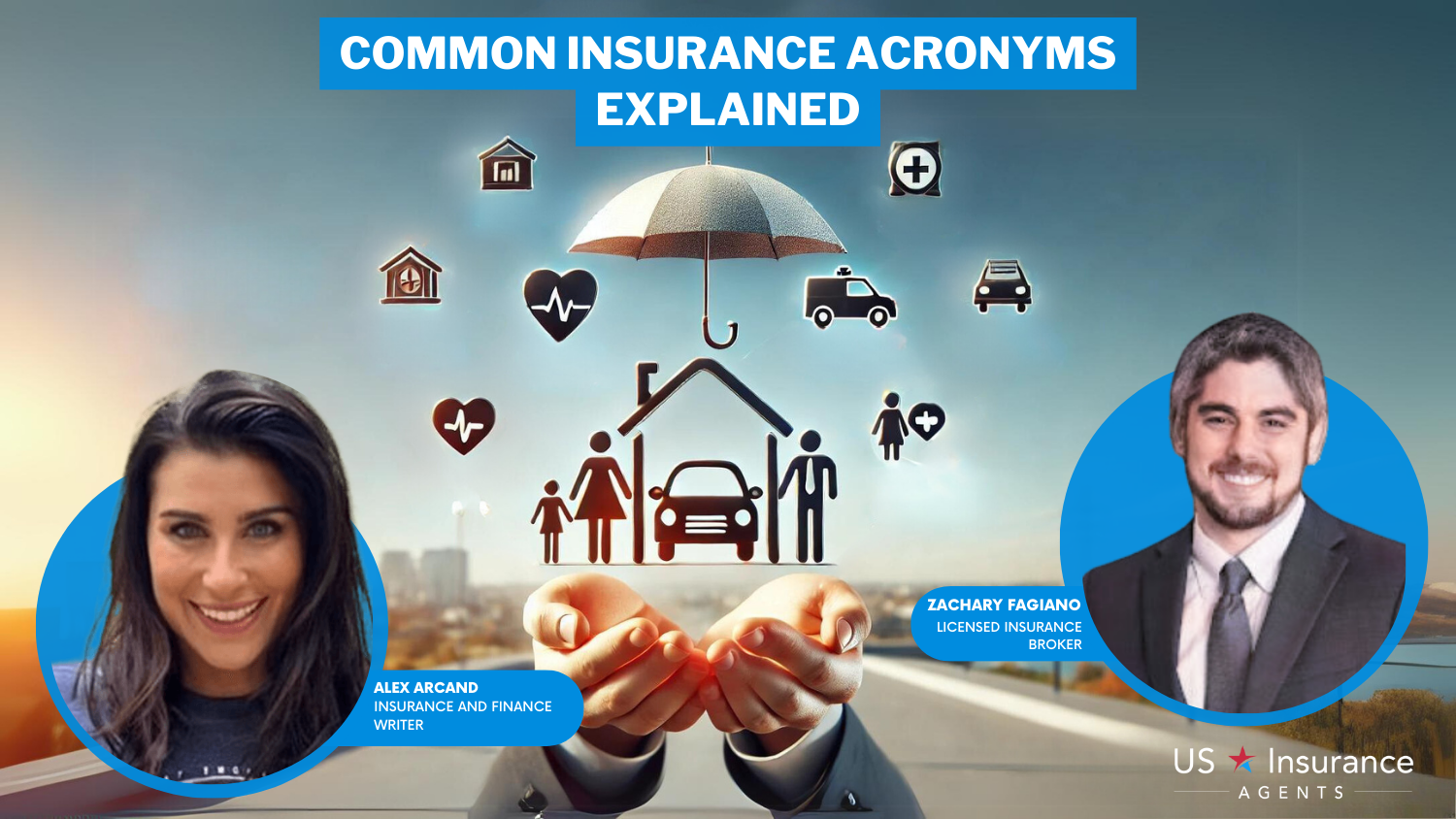Commonly Misunderstood Insurance Concepts
Unlock the mysteries of commonly misunderstood insurance concepts and gain a solid understanding of complex terms. Whether you're baffled by deductibles, confused about coverage limits, or unsure about the intricacies of liability. Our comprehensive guide offers clear explanations, practical examples, and expert insights to demystify insurance jargon and empower you to make informed decisions.
Read more Secured with SHA-256 Encryption





Table of Contents
Table of Contents


Head of Content
Meggan McCain, Head of Content, has been a professional writer and editor for over a decade. She leads the in-house content team at Quote.com. With three years dedicated to the insurance industry, Meggan combines her editorial expertise and passion for writing to help readers better understand complex insurance topics. As a content team manager, Meggan sets the tone for excellence by guiding c...
Meggan McCain


Sr. Director of Content
Sara Routhier, Senior Director of Content, has professional experience as an educator, SEO specialist, and content marketer. She has over 10 years of experience in the insurance industry. As a researcher, data nerd, writer, and editor, she strives to curate educational, enlightening articles that provide you with the must-know facts and best-kept secrets within the overwhelming world of insurance....
Sara Routhier


Licensed Insurance Agent
Ty Stewart is the founder and CEO of SimpleLifeInsure.com. He started researching and studying about life insurance when he got his first policy for his own family. He has been featured as a life insurance expert speaker at agent conventions and in top publications. As an independent licensed life insurance agent, he has helped clients nationwide to secure affordable coverage while making the...
Ty Stewart
Updated July 2025
Insurance Concepts. If you’ve ever felt overwhelmed by terms like deductibles, coverage limits, or liability, you’re not alone.
In this comprehensive guide, we aim to demystify these complex insurance concepts and provide you with the knowledge to make informed decisions.
We cover a range of key topics, including understanding deductibles and how they impact your premiums, deciphering coverage limits to ensure adequate protection, and unraveling the intricacies of liability coverage.
Our goal is to empower you with the information you need to navigate the world of insurance confidently. Ready to find the best insurance rates tailored to your needs? Enter your zip code now and compare rates from top insurance providers. Take control of your insurance journey today.
Insurance Basics
Several insurance misconceptions pertain to the basic concept of insurance itself. Learn about each policy you purchase so that you have a thorough understanding of all the ins and outs.
Misconception #1: “I will get more than my property was worth since I filed a claim.”
Fact: The first misconception violates the principle of indemnity, which is defined as a protection or security taken against a financial burden or other loss. In other words, you cannot profit from insurance. When you take out an insurance policy, it serves as an indemnity, not an investment that grows over time.
Misconception #2: “The Insurance company sets my premiums aside until I need to use them for a claim.”
Fact: The truth is: insurance is based on a risk pool. It is not hard to see why most people are unaware of this fact since many insurance agents are likely to avoid the subject. To put it simply, insurance carriers pool the money of all of their customers in order to pay for claims. This is why insurance rates go up in a particular area if there have been several automobile accidents or if a storm caused widespread damage. While some people may feel that this seems unfair, the truth is that most policyholders will never pay enough premium to offset a total loss claim on either their home or automobile, so risk pooling is necessary for insurance companies to stay in business.
Misconception #3: “Paying your premiums consistently and on time means your rates will not go up after filing a claim.”
Fact: A large number of people who see surcharges, rate increases, or a non-renewal notice after filing one large or several small claims feel that they have been treated unfairly. For long-time customers, it can seem cruel that despite years of dutifully making payments each month, the insurer makes the decision to drop them as a customer.
Misconception #4: “My insurance company will never know if I lie about something on my application.”
Fact: Potential customers frequently omit relevant information from their insurance applications such as the fact that they are married, that there is a dog in the household, or that they had one or more claims in the last five years. Despite the impression that insurance companies are only able to work with the information they are given, the reality is that insurers have developed ways to uncover things that are often misrepresented or omitted entirely. At best, being caught in a lie could result in a change to your policy that costs more money. However, refusing to admit to something major, such as a large fire claim from just two years ago, only hurts you and could result in a policy cancellation.
Misconception #5: “Replacement cost is a waste of money; it is just a way to make you pay more.”
Fact: When it comes to personal property, policyholders often do not understand the difference in replacement cost (RCT) versus actual cash value (ACV) until they have had a claim. So what is the difference? Take this example: your house is damaged in a tornado and you need to buy new furniture. If your house is insured with replacement cost on personal property, your insurer will give you $10,000 for the bedroom suite you spent $9,000 on last year, because that is what it costs to buy a similar suite today. However, actual cash value reimburses on a “cash value minus depreciation” model. So with ACV, you would only get $8,500 for a new bedroom suite because that is what your old one would be worth today.
Misconception #6: “It is okay if you do not pay attention to a cancellation or non-renewal notice. Insurance companies send those letters out all the time. It is just a scare tactic.”
Fact: Cancellation notices and non-renewal letters are very serious matters and should be taken as such. Policyholders who are chronically late paying their bills may think the letter is just a bill reminder that they can ignore, but that is not always the case. Any time you receive a cancellation not related to billing or non-renewal letter from your insurer, the best thing to do is contact your agent immediately to see if there is anything that can be done to save your policy.
Misconception #7: “I have been with my insurance company for over 20 years. They will never cancel my policy.”
Fact: While there are occasionally perks to being a long time customer with an insurer, it is rare that loyalty can spare you from the harshest insurance guidelines. Even if you have been insured through the same company for over a decade, a total loss fire claim will probably result in a non-renewal letter immediately after your claim is settled.
Misconception #8: “I did not do anything wrong, so I do not have to pay the deductible. Only people who are guilty of something have to pay those.”
Fact: Whenever you file a claim on your insurance, your deductible applies. It does not matter whether an accidental fire or a tornado that was completely out of your control caused the damage. A deductible is the amount of money you are contractually obligated to pay when you use your coverage and almost always applies.
Misconception #9: “Personal finances have no effect on my insurance rates. Insurers do not need all of my personal information just for a quote.”
Fact: A few decades ago, an insurance agent could look at a chart and come up with a quote for a customer in a matter of minutes. As technology has changed and evolved over the years, so too has the quoting process changed. Insurance companies now use dozens of pieces of information in order to create a personalized quote. For many companies, that includes your social security number so they can perform a “soft hit” on your credit. To insurers, a more financially stable policyholder is less of a risk.
Free Life Insurance Comparison
Compare Quotes From Top Companies and Save
Secured with SHA-256 Encryption
The Truth About Claims
One of the biggest reasons policyholders leave their insurers is because of claims. Yes, it is true that insurance companies sometimes treat people unfairly. However, it is even more common to see people change companies because their misconceptions about the claims process lead to disappointment. Here are just a few of the most widely held myths about claims.
Misconception #1: “All vehicles are automatically repaired with new parts.”
Fact: For a policyholder with a brand new car, or for one who has replacement cost on their policy, this may be the case. However, the majority of people needing new parts for their car will find that the parts were previously used. Luckily, those parts are typically in excellent condition so there is no need to worry about performance issues later on down the road.
Misconception #2: “I lied about what happened during my automobile accident but it is okay because the insurance company will never know.”
Fact: Not only do insurance companies have a knack for finding out the truth about claims, but they actually have entire departments devoted to fraud. It is true that some people manage to get away with committing insurance fraud, but for the majority of would-be fraudsters, that is not the case.
Misconception #3: “I did not cause the accident so I do not have to pay my deductible.”
Fact: This one is a little tricky because it is circumstantially true. If another driver hits you and files a claim on his or her insurance, you will not pay a deductible since their policy is covering your damage. However, if you file a claim on your policy so that your insurer will repair your vehicle, yes your deductible will apply.
Misconception #4: “While the insurance company is paying for the damage from the wreck, I am going to have them pay for that old dent in the hood, too.”
Fact: It is not uncommon for people to think that they can have pre-existing damage repaired while the auto body shop works to repair the damage from an accident. Although it is possible to get it repaired at the same time, you should not expect the insurance company to pay for it. Adjusters can tell whether damage is new or old and they will only approve payment for damage related to the claim.
Misconception #5: “I really loved my car, but the insurance company said it was a total loss so I guess it is gone forever.”
Fact: Believe it or not, it actually is possible to keep a car that was totaled in an accident. The term “totaled” simply means that it would cost more to repair the vehicle than it is currently worth. If you have the right coverage, you could get the vehicle repaired with your claim check and just wind up with a salvage title.
Misconception #6: “The other driver caused the accident so his insurance will pay for everything.”
Fact: There are a couple of flaws in this logic. To start, a driver who causes damage to several vehicles at once may not have enough liability coverage to pay for everything. Alternatively, the other driver’s insurance may not pay for things like a rental car if the damage to your car is minor and can be repaired quickly.
Misconception #7: “I did not see rental car coverage listed on my policy, but I am sure it is automatically included if I need it.”
Fact: Rental car coverage is something that is not automatically included on all auto policies and is not always even available for customers who only carry liability coverage. If you do not have a back up vehicle to drive in the event your primary vehicle has to go to the shop, you need rental car coverage.
Misconception #8: “I can take my car to whatever body shop I like and my insurance will pay for everything.”
Fact: The cost of labor varies from shop to shop, so estimates to repair your car will not be the same everywhere. If a claims adjuster feels that a repair bill is excessive, the entire cost to repair the damage may not be paid, which will leave you with a bill. Be sure to check and find out if your insurer has preferred shops before you take your vehicle in for repairs.
Misconception #9: “When my appliances start getting worn out or quit working, I will just call and file it on my insurance so I can get new ones.”
Fact: Insurance is not the same as a warranty. The intention is to reimburse you for a sudden, unexpected loss. Since wear and tear over time is to be expected, it is not a covered loss.
Myths About Home & Property Insurance
Just as with auto insurance, there are several myths about property insurance that still will not seem to go away. Here are a few of the most common falsehoods.
Misconception #1: “Homeowners insurance will repair anything that needs to be fixed when it gets old and worn out. You can call them if you need to upgrade your old carpet or update your kitchen, too.”
Fact: Insurance will repair or replace things that are damaged suddenly by unexpected circumstances. You cannot use your insurance to upgrade or update your home because you feel the value has gone down and you cannot file a claim on property that is simply worn out. Doing so is a good way to have your policy non-renewed.
Misconception #2: “Anything that happens to my house is covered on my homeowner’s insurance.”
Fact: There are several types of loss that are not covered under a standard home insurance policy. However, there are two types of loss that many people expect to be covered: flood and earthquake. Generally, these losses are covered under separate policies.
Misconception #3: “Home insurance is what you buy when you have a home. It is all the same.”
Fact: Actually, homeowner’s insurance is kind of specific. You can only purchase it if you personally own a single-family house. If you own a mobile home, condo, multi-family dwelling, or rent, then you need a different type of policy.
Misconception #4: “All my stuff is insured on my homeowner’s policy.”
Fact: Personal property coverage on your homeowner’s policy has limits to what is covered. Some of the most common items that are not covered include: motorcycles, boats, RVs, trailers, farm equipment, ATVs, and other structures.
Misconception #5: “Replacement cost is just a way to rip off customers. There is no need to insure your house for more than the market value.”
Fact: This really boils down to what you would want to do if your house was subject to a total loss. If you would want it to be rebuilt exactly as it stands today, you need replacement cost coverage since it would probably cost more to rebuild it than to buy something similar.
Misconception #6: “If I or one of my family members gets hurt at home, we can just file a claim on the medical payment section our homeowner’s insurance instead of using our health insurance.”
Fact: Medical payments coverage on a homeowner’s policy provides coverage for guests who are hurt on your property by accident. Family members and residents of the household are not typically covered.
Misconception #7: “I do not want to get renter’s insurance. Why should I cover the house if I do not own it?.” OR “The landlord already has insurance on the house so I do not need to get renter’s insurance. He is covering my stuff, too.”
Fact: Landlord insurance and renter’s insurance are two entirely different policies that each cover a different set of property. Renter’s insurance covers the personal property of someone who rents or does not own their home, whereas landlord insurance covers a dwelling that is leased to others.
Misconception #8: “The house is not in great shape but it is still safe to live in. I should be able to get insurance on it just like any other house.”
Fact: Insurance companies are becoming increasingly selective about the condition of homes they insure. Especially if your home has an old roof that is in disrepair, you may have trouble getting insurance since it is considered a risk.
The truth is, if there is any aspect of insurance that you do not understand, it is imperative that you find the answer before it is too late. You never know when a misunderstanding could come back to haunt you. Furthermore, insurance agents usually do not mind when their clients ask questions about their policies. Of course, you bought the policy; your agent wants to make sure that you are happy with it!
While there are a multitude of falsehoods circulating about property insurance, claims, and the entire insurance process in general, the confusion does not end with this section of the insurance industry. In fact, many people have several false beliefs about auto insurance, life insurance, and commercial insurance. Keep reading for a look at some of the biggest myths in circulation.
Mistaken Beliefs Regarding Auto Insurance
Even though most states require all vehicle owners and operators to purchase and maintain automobile insurance coverage, that does not every policyholder has a complete understanding of what their coverage does. In fact, many people do not understand how their insurance works until they are involved in an accident. While there is a lot of confusion about auto insurance, here are some of the most persistent misconceptions.
Misconception #1: “Full coverage insurance is the same thing everywhere.”
Fact: There is no specific industry definition of full coverage auto insurance. In reality, a full coverage policy can look drastically different when compared between companies, agencies, and drivers. Generally, full coverage includes at least bodily injury and property damage liability, collision, and comprehensive. However, some agencies also automatically include uninsured motorist coverage and roadside assistance on a policy with full coverage.
Misconception #2: “My neighbor is loaning me his car, but he does not have insurance. So I will get a policy to make sure I am covered.”
Fact: Technically, it is possible to get insurance to cover yourself when driving someone else’s vehicle if you do not own one. However, the way that people go about it is often wrong. When borrowing a friend or neighbor’s vehicle for an extended period of time, you cannot take out a standard policy on yourself and their car. Since the car does not belong to you, you have no insurable interest in the vehicle. It is possible to purchase a non-owner’s policy that will provide liability coverage for you, but it will not provide coverage for any damage you may cause to the vehicle.
Misconception #3: “Anyone who drives my car is covered under my insurance.”
Fact: Every automobile insurance policy contains a list of excluded drivers. Typically, this list will include drivers who take the vehicle without the owner’s consent or permission, underage drivers, and unlicensed drivers. However, some companies only cover drivers who are specifically named on the policy, so it is a good idea to check whether or not friends or family members are covered before you loan out your car.
Misconception #4: “If I get hurt in an accident, the bodily injury coverage will pay for my medical bills.”
Fact: It can be comforting to see limits of $25,000/$50,000 for bodily injury coverage on your policy when you think about medical bills that could result from a potential accident. Unfortunately, bodily injury is covered under the liability portion of your insurance and therefore insures the other driver. In an accident you cause, your medical payments coverage shows the limit available for bills from healthcare providers.
Misconception #5: “Since I have automobile insurance, everything in my car is covered under that policy.”
Fact: There are varying degrees of truth to this statement but it depends on the situation. For starters, anyone with a liability-only policy will not have any coverage on the contents of their vehicle. Policyholders with collision but no comprehensive coverage may have some coverage for personal belongings under specific circumstances only. In order to get protection against theft, fire, or flood, you will need to purchase comprehensive coverage. However, there may still be limits on the amount your insurer will pay for any covered loss.
Misconception #6: “I did not get a ticket or citation when the accident happened so that means I cannot be considered at-fault for the accident.”
Fact: Believe it or not, tickets do not always hold bearing on who is deemed at fault for an accident. In some accidents, all drivers may receive citations from police even though one individual caused the accident. If no driver is willing to accept fault for causing the accident, the claims team will perform an investigation to determine what exactly happened.
Misconception #7: “After I got a speeding ticket, I went to traffic school so it will not affect my insurance or driving record.”
Fact: Although traffic school or defensive driving classes may keep points from appearing on your driving record, the ticket itself is still there. Insurance companies periodically receive reports from the state DMV that detail any tickets or accidents their policyholders have been involved in. Once notified about a speeding ticket, your insurance company may place a surcharge on your policy.
Misconception #8: “It is not possible to get full coverage on a vehicle if it is more than ten years old.”
Fact: This is absolutely not true. The issue here is more about practicality and personal finances rather than strict industry guidelines. Sure, you may not get much if your twelve year old Honda gets totaled, but would you be able to easily replace it without that meager claim check? If you do not have much in savings and a less than stellar credit score, it could make more sense to carry full coverage so you do not wind up stuck without a vehicle.
Misconception #9: “I drive but I do not own a car, so I do not need insurance.”
Fact: You cannot always rely on the insurance policies of others to cover you when borrowing a vehicle. It is best to have a non-owner’s insurance policy to make sure that you are covered. Additionally, this type of policy could help keep your rates low when you do purchase a car in the future since insurance companies tend to give drivers without prior insurance higher premiums.
Misconception #10: “Uninsured Motorist coverage pays for damage I cause if I hit someone without insurance.”
Fact: Not all policies include uninsured motorist (UM) coverage, but it is a good feature to have. Without a proper explanation, one could easily assume that UM is liability coverage for drivers without insurance. However, that is not the case. In reality, UM provides coverage for you in the event you are hit by an uninsured driver, become the victim of a hit-and-run, or have someone with inadequate liability limits hit your car.
Free Life Insurance Comparison
Compare Quotes From Top Companies and Save
Secured with SHA-256 Encryption
Erroneous Ideas About Life Insurance
Life insurance is quite possibly one of the most misunderstood products in the industry since it is so rarely used. While someone may make several auto or property claims throughout their lifetime, it is possible to go an entire lifetime without ever having experience with a life insurance policy. Because of this, there are several myths that persist.
Misconception #1: “I want to get a life insurance policy on my family member so that I can use that money for my kids’ college funds or a trip to Europe. Life insurance is an investment.”
Fact: Life insurance is not the best tool for investments. For a better return on investment, policyholders should look into savings plans, college funds, IRAs, or other financial products that have excellent interest rates.
Misconception #2: “I am so old now, no one would write a life insurance policy for me.”
Fact: Unless you are over eighty years old, this is not necessarily true. There are actually life insurance policies designed for seniors. Although they may cost more than a younger person’s policy, they may still be sufficient for your needs.
Misconception #3: “I have life insurance through work so I do not need another policy.”
Fact: Unfortunately, the majority of life insurance policies provided by employers are not transferable after employment ends. So, if you ever leave or lose your job, you may lose your life insurance policy as well.
Misconception #4: “The breadwinner in our family has life insurance and that is all that matters.”
Fact: Many people do not think about how drastically their lives would change if the secondary earner or stay at home parent were to pass away. Although they may not be contributing much to the family’s finances, everything they do would have to be supplemented in some way upon their passing. Furthermore, it is important to think of the financial burden the family would take on if there were no life insurance to pay for a funeral.
Misconception #5: “My health issues will not allow me to get a life insurance policy.”
Fact: So many people have significant health concerns that high-risk policies have been developed. These policies typically do not require a health exam and while they do cost more than comparable plans for healthier individuals, they are a way to obtain coverage that might not otherwise be accessible.
Misconception #6: “I am young and do not plan on dying anytime soon. I will worry about life insurance when I am older.”
Fact: The truth is: no one plans on dying. Unfortunately people of all ages die every day and many of them had no expectation that the end was in sight. Waiting until you are nearing retirement to buy life insurance is never a good idea.
Misconception #7: “All I need is a burial policy.”
Fact: You might be surprised to find how many gaps burial policies leave. For instance, a $10,000 burial policy may cover most of the bills for your funeral, but what about your mortgage? If you pass away, will your family still be able to afford living in your home? These are things to consider before buying a policy.
Misconception #8: “I do not have a spouse or any dependents so there is no point in life insurance for me.”
Fact: Unless you keep enough money in your savings account to cover the cost of a funeral, you do need a life insurance policy. Most people are not comfortable with the idea of leaving their parents, siblings, or other relatives stuck with the bill for their funeral.
Common Myths about Health Insurance
Misconception #1: The Affordable Care Act and “Obamacare” are different
Fact: Both terms refer to the same law. Sometime the ACA and Obamacare are used interchangeably, but other times, they are used for more nefarious political motives. A recent poll by NBC News / Marist showed that 56% of Kentucky residents had an unfavorable impression about Obamacare while only 22% had an unfavorable impression of Kynect, the state run health insurance exchange created specifically because of the Affordable Care Act.
Misconception #2: The Affordable Care Act gives health insurance companies the right to set prices based on specific medical conditions.
Fact: The ACA specifically prohibits health insurers from basing their rates on pre-existing conditions of the individual.
Misconception #3: Most people have private health insurance plans.
Fact: There are a lot of people in this country and the US Government already pays for roughly 54% of all healthcare when including coverage such as Medicare, Medicaid, Tricare and Children’s Health Care.
Misconception #4: I’ll save money by paying a yearly penalty instead of buying health insurance coverage.
Fact: While you might currently be health, it doesn’t necessarily mean you will always stay that way. If you are unexpectadly hurt or get sick, your medical bills could far exceed any cost savings you get from not having health insurance. Penalties for not having health insurance are rising each year and are about $700 per adult or 2.5% of household income in 2016.
Misconception #5: Health insurance will pay for all healthcare related expenses.
Fact: Even if you obtained a really great policy from work or on your own, you will most likely still be liable to pay for deductibles, copays or co-insurance. Additionally, you could be liable for the costs of items that may not be covered by your plan or if you do not follow the rules outlined to receive benefits such as by seeing an out of network doctor.
Commercial Insurance Falsehoods
Even business owners get a little confused sometimes. By falling for misconceptions about commercial insurance, you can put not only yourself but also your business and your employees at risk. Be sure you understand the basic concepts of commercial insurance so that you do not fall victim to a costly misunderstanding.
Misconception #1: “I work out of my home so I do not need a commercial policy. All of my equipment is covered under my homeowner’s insurance.”
Fact: This is not always true. For a hobby business that is not particularly lucrative, your equipment may be covered under your homeowner’s insurance. Check with your insurance agent to see if your carrier has a cap on how much money you can earn from your business before a commercial policy is required. Alternatively, if you have employees or particularly expensive equipment that is needed to do your job, you probably need a commercial policy as these things will not be covered under a standard home insurance policy.
Misconception #2: “I might use my wife’s van for work one day so I will add it to my commercial auto policy.”
Fact: Only vehicles that are used by your company should be covered under your commercial auto policy. By misrepresenting vehicles, you run the risk of having future claims denied by your insurer.
Misconception #3: “My office is worth $500,000 now, but I hear property values are going up, so I will insure it for $2 million just in case.”
Fact: If property values go up, you have to adjust your policy accordingly. Unfortunately, you cannot insure your business for what it may be worth later on down the road. Even if you have it insured for $2 million, the most you would get for a claim settlement would be $500,000 if that is the true value.
Misconception #4: “General liability coverage will pay for medical payments if one of my employees gets hurt on the job.”
Fact: Although general liability covers a wide range of risks, employee injuries is not one of them. To cover your employees who may be hurt while working, you need to purchase workman’s compensation.
Misconception #5: “My business is incorporated so I do not need insurance.”
Fact: Some business structures, like LLC’s are able to create a limit on how much you can personally be held liable for. However, your business is still at risk of being sued for losses. Additionally, it is still possible to be personally sued for malpractice or professional negligence even if you have a Limited Liability Company.
The truth is, there is no reason to harbor misconceptions about any of your insurance policies. If there is any part of your policy that you do not understand, or have doubts about its function, take time to ask your agent. Not only are they content to give free advice to their policyholders, they are also typically happy to offer much needed advice to anyone that may potentially be a future customer.
Frequently Asked Questions
What is a deductible?
A deductible is the amount of money that a policyholder is responsible for paying before their insurance coverage kicks in. For example, if a policy has a $500 deductible and the policyholder makes a claim for $1,000 in damages, they will have to pay $500 out of pocket and the insurance company will pay the remaining $500.
What are policy limits?
Policy limits are the maximum amount of coverage that an insurance policy provides. For example, if a car insurance policy has a $100,000 bodily injury limit per person, that means the insurance company will pay up to $100,000 for injuries to one person in an accident.
What are exclusions?
Exclusions are events or circumstances that are not covered by an insurance policy. For example, if a homeowner’s insurance policy has an exclusion for flood damage, any damage caused by a flood will not be covered by the policy.
What are pre-existing conditions?
Pre-existing conditions are medical conditions that existed before a person enrolled in a health insurance policy. Some health insurance policies may exclude coverage for pre-existing conditions for a certain period of time.
What is actual cash value?
Actual cash value is the value of a property at the time it was damaged or destroyed, taking into account depreciation. For example, if a 10-year-old car is damaged in an accident, the actual cash value of the car would be less than the cost of a brand new car.
What is replacement cost value?
Replacement cost value is the amount of money it would cost to replace a damaged or destroyed item with a new item of similar kind and quality. For example, if a 10-year-old roof is damaged in a storm, the replacement cost value of the roof would be the cost of a new roof of similar kind and quality.
Get a FREE Quote in Minutes
Insurance rates change constantly — we help you stay ahead by making it easy to compare top options and save.







